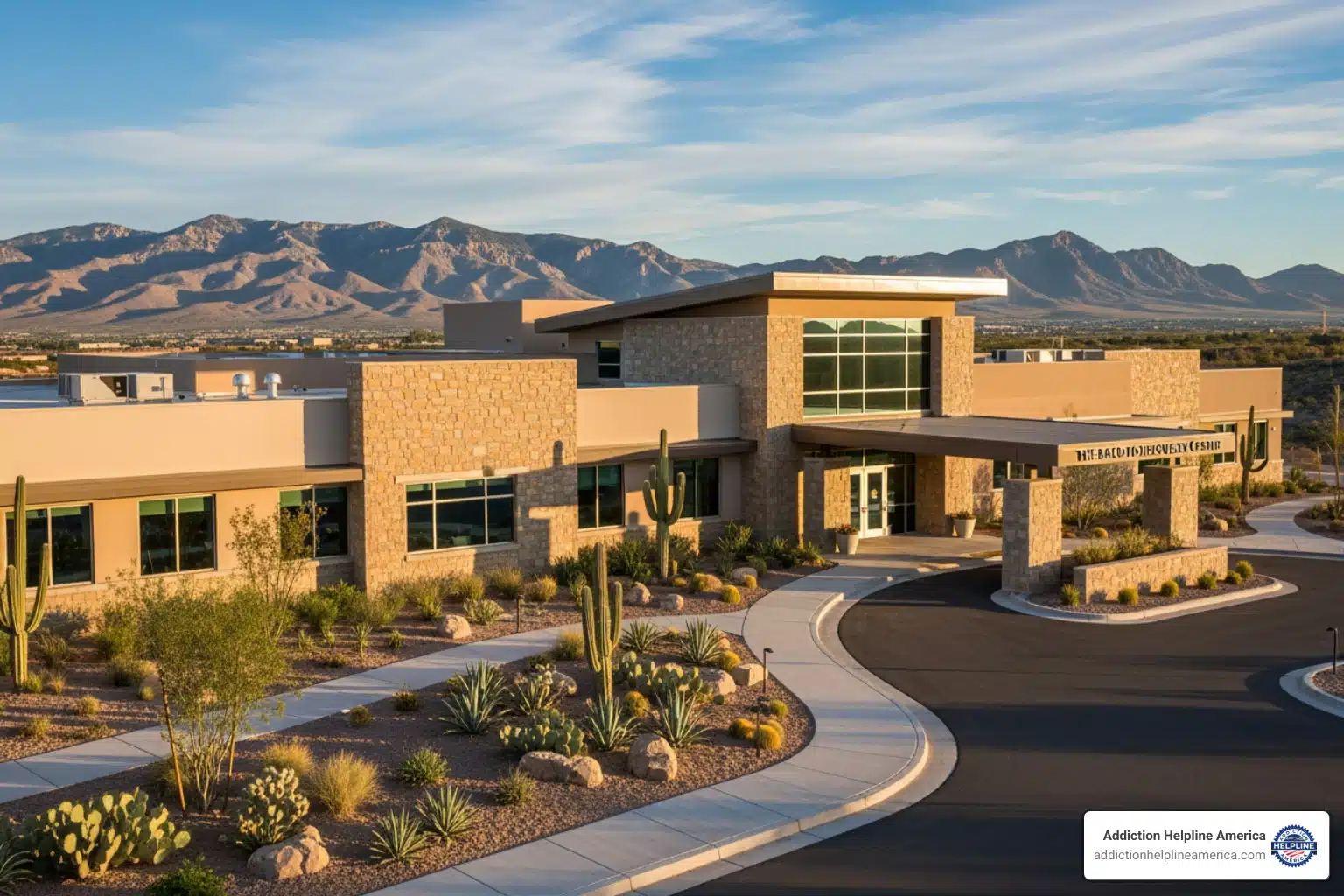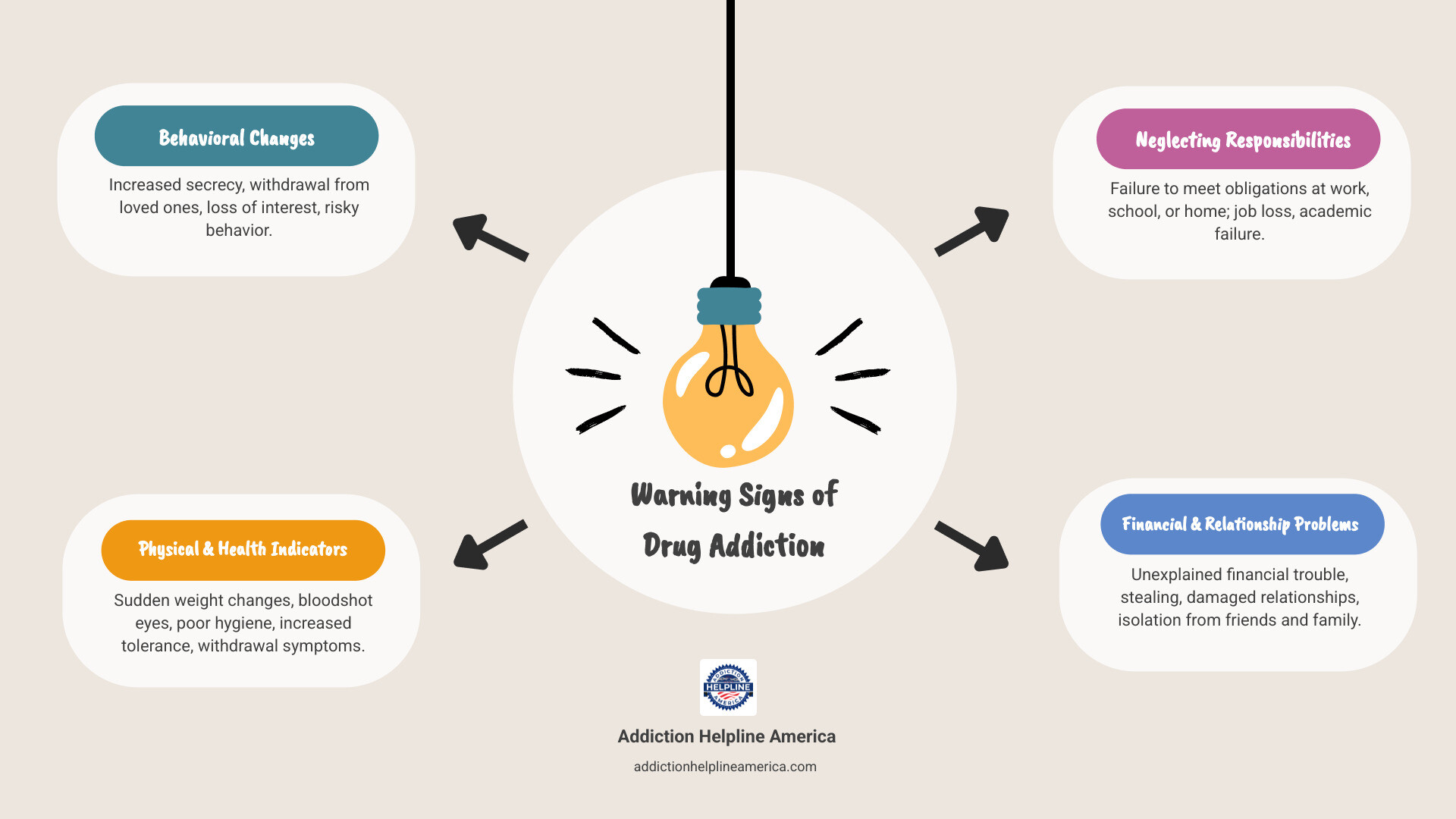
Understanding El Paso’s Critical Need for Quality Addiction Treatment
Drug rehab centers in el paso offer vital services like medical detox, inpatient and outpatient care, and dual diagnosis support. Facilities accept various insurance plans (Medicare, Medicaid, private) and provide payment assistance for those with substance use disorders.
Quick Overview of El Paso Treatment Options:
| Treatment Type | Best For | Typical Duration |
|---|---|---|
| Medical Detox | Managing withdrawal symptoms safely | 3-7 days |
| Inpatient/Residential | Severe addiction requiring 24/7 support | 28-90+ days |
| Intensive Outpatient (IOP) | Moderate addiction with some stability | 3-6 months |
| Outpatient Programs | Mild addiction or aftercare support | Varies |
| Medication-Assisted Treatment (MAT) | Opioid or alcohol addiction | Ongoing |
El Paso faces a significant substance use crisis, ranking third in Texas for addiction to cocaine, heroin, and methamphetamine. From 1999 to 2014, meth treatment admissions surged by 500%, and nearly 20% of adults in the metro area engage in heavy drinking.
These numbers represent neighbors, family, and friends who need effective help. Fortunately, El Paso has about a dozen specialized rehab centers offering different levels of care.
Finding the right one can be overwhelming, but we can help. Addiction Helpline America connects individuals with appropriate drug rehab centers in el paso and across Texas, guiding you to a facility that matches your needs, insurance, and situation.
Strategy 1: Assess Your Needs to Find the Right Level of Care
Before contacting drug rehab centers in el paso, it’s important to assess the severity of the addiction and any co-occurring mental health issues. Matching the level of care to the need is the first step toward effective treatment.
Recognizing the Signs You Need Professional Help
Addiction often creeps in slowly. Look for behavioral changes like increased secrecy, irritability, and loss of interest in hobbies. Physical symptoms can include unexplained weight changes, bloodshot eyes, or poor hygiene. Neglecting responsibilities at work, school, or home is a common sign, as are financial troubles like constant borrowing or stealing. You may notice damaged relationships and isolation. Physically, the body develops an increased tolerance, requiring more of the substance to feel an effect. When use stops, painful or dangerous withdrawal symptoms like nausea, shaking, and severe anxiety can occur. For alcohol and benzodiazepines, withdrawal can be fatal, making medical supervision essential. If this sounds familiar, it’s time to seek help.
Matching Program Types to Your Recovery Goals at Drug Rehab Centers in El Paso
Different programs fit different needs, from 24/7 medical care to flexible schedules that work around your job.
Medical detoxification is often the first step, providing safe, medically supervised withdrawal from substances over 3 to 7 days. It’s crucial for alcohol, opioids, and benzodiazepines. Facilities like Rio Vista Behavioral Health offer these programs to clear the fog so recovery work can begin.
Inpatient residential treatment provides a complete reset for severe addiction. You live at the facility for 28 to 90+ days, focusing entirely on recovery without outside triggers. El Paso Behavioral Health System is one local center offering this immersive care.
Outpatient programs offer flexibility for less severe addiction or as a step-down from inpatient care. You attend counseling sessions during the day or evening and return home at night.
Intensive outpatient programs (IOPs) are a middle ground, offering several hours of treatment multiple times a week for 3 to 6 months. This provides significant structure while allowing you to maintain work or family commitments.
Partial hospitalization programs (PHPs), or “day treatment,” involve attending the facility for several hours daily, five days a week, for intensive therapy. It’s ideal for those who need serious help but not 24/7 residential care.
Sober living support is a critical bridge between treatment and independent living. These drug-free homes, like Casa Vida de Salud operated by The Recovery Alliance of El Paso, provide a supportive environment with house rules that reinforce recovery skills.
Choosing the right program isn’t guesswork. At Addiction Helpline America, we help you find drug rehab centers in el paso that match your unique situation and needs.
Strategy 2: Explore Specialized Drug Rehab Centers in El Paso
Addiction treatment isn’t one-size-fits-all. A program that works for one person may not work for another, which is why exploring specialized options at drug rehab centers in el paso is so important.
Finding Treatment for Co-Occurring Disorders
Addiction rarely travels alone; it often co-occurs with mental health conditions like anxiety, depression, or PTSD. This is called a dual diagnosis. Approximately 50% of people with substance use disorders also have a mental health disorder. Treating both simultaneously through integrated care is the gold standard for recovery. Drug rehab centers in el paso like Rio Vista Behavioral Health and Harmony Road Recovery specialize in creating personalized treatment plans that address the whole person, significantly improving outcomes.
Specialized Programs for Unique Populations
Your background and experiences shape your recovery. The best drug rehab centers in el paso offer programs custom to specific populations.
Veterans face unique challenges like PTSD. MedMark Treatment Centers in El Paso is part of the VA Community Care Network, offering accessible opioid treatment.
Native Americans can find culturally sensitive care at Harmony Road Recovery, which offers a specialized track that respects traditional values.
Gender-responsive care for men or women addresses unique biological and social factors in a safe, comfortable environment.
Adolescents and young adults (12-17) need age-appropriate care, like that offered at Evolve Residential Treatment Centers for Teens, which combines addiction treatment with academic and family support.
Understanding Medication-Assisted Treatment (MAT)
Medication-Assisted Treatment (MAT) is not substituting one drug for another. It’s an evidence-based approach combining FDA-approved medications with therapy to treat opioid addiction and alcohol withdrawal. MAT stabilizes brain chemistry, reduces cravings, and helps prevent relapse, allowing individuals to focus on the psychological work of recovery.
For opioid use disorder, medications include methadone (offered at MedMark Treatment Centers) or buprenorphine (Suboxone). For alcohol addiction, medications like naltrexone can reduce cravings. By addressing the physical aspects of addiction, MAT frees people to engage more fully in therapy. Many drug rehab centers in el paso, including Harmony Road Recovery and MedMark Treatment Centers, offer MAT as a core part of their programs.
Strategy 3: Verify Costs, Insurance, and Payment Options
Financial concerns should never stand between you and recovery. Many drug rehab centers in el paso work with various insurance plans and offer assistance programs to help people access the care they need.
How to Pay for Drug Rehab Centers in El Paso
Understanding your payment options is the first step toward removing financial barriers. Here are the most common ways to pay for treatment:
- Private insurance: Most major plans (Aetna, Blue Cross Blue Shield, Cigna) cover addiction treatment. Many drug rehab centers in el paso, like Rio Vista Behavioral Health, offer free insurance verification to clarify your benefits.
- Medicaid: This state and federal program provides health coverage for low-income individuals and families, including a wide range of addiction treatment services.
- Medicare: Serves individuals 65+ and some younger people with disabilities, covering both inpatient and outpatient addiction treatment.
- Sliding scale fees: Some non-profit or community centers adjust the cost of treatment based on your income.
- Government assistance and grants: Federal (SAMHSA) and state funds can provide financial aid. MedMark Treatment Centers, for example, highlights grant funding assistance for qualified patients.
- Private pay and financing: Self-funding is an option, and many centers offer payment plans or partner with third-party healthcare lenders.
Finding Affordable Treatment Resources
Beyond traditional rehab centers, El Paso has several community resources that provide affordable or free support for substance abuse.
- Community health centers: Offer substance abuse counseling and support services at reduced costs, often on a sliding scale.
- University counseling services: The University of Texas at El Paso (UTEP) offers Counseling and Psychological Services, and the Southwest Counseling Center Inc. at Southwest University provides low-cost support. The International Business College-El Paso also has a Drug and Alcohol Abuse and Prevention Program.
- Non-profit organizations: The Recovery Alliance of El Paso offers peer recovery support, coaching, and sober housing. They publish a Recovery Resource Guide and can be found on Facebook, Instagram, or YouTube.
- Free drug rehab centers: Though less common and often with waitlists, state-funded or faith-based programs offer care at no cost. We’ve created a guide on are there free drug rehab centers that explores this topic.
Strategy 4: Vet the Quality and Effectiveness of a Program
Not all treatment centers offer the same level of care. Taking time to research and vet a facility before committing can make the difference between lasting recovery and a setback. Think of it like choosing a surgeon—careful consideration is key.
Key Indicators of a High-Quality Rehab Center
When evaluating drug rehab centers in el paso, look for these markers of quality:
- Accreditations: Seals of approval from CARF (Commission on Accreditation of Rehabilitation Facilities) or The Joint Commission indicate a facility meets high standards for safety and quality.
- Licensed Professionals: A quality center has a team of experienced medical doctors, psychiatrists, and therapists. Patient testimonials for centers like MedMark Treatment Centers often praise the compassionate staff.
- Evidence-Based Therapies: Treatment should use proven methods like CBT (Cognitive Behavioral Therapy) and DBT (Dialectical Behavior Therapy) to address the root causes of addiction.
- Individualized Care: Avoid cookie-cutter programs. The best centers create a personalized care plan for your specific history and needs, including any co-occurring disorders.
- Comprehensive Services: Look for a full continuum of care, from detox and medical assessments to aftercare planning.
How Aftercare Boosts Long-Term Success
Completing a rehab program is a huge accomplishment, but it’s just the beginning. Aftercare is essential for sustained recovery.
- Relapse Prevention Planning: A quality program helps you create a detailed plan to identify triggers and develop healthy coping skills.
- Ongoing Support: This includes continued counseling, therapy check-ins, and medication management to provide accountability.
- Sober Living Homes: These structured, substance-free homes, like those offered by The Recovery Alliance of El Paso, bridge the gap between treatment and independent living.
- Peer Recovery Coaches: People with lived recovery experience offer invaluable mentorship and guidance. The Recovery Alliance of El Paso champions these services.
- Local Peer Support Organizations: Groups like AA (Alcoholics Anonymous), NA (Narcotics Anonymous), and family groups like Al-Anon and Nar-Anon provide community, fellowship, and a structured path to recovery.
Frequently Asked Questions about Drug Rehab in El Paso
When you’re considering treatment, it’s natural to have questions about your job, family, and finances. Here are answers to some of the most common concerns about drug rehab centers in el paso.
How long does rehab in El Paso typically last?
Treatment duration is custom to individual needs, as there is no one-size-fits-all answer.
- Medical detox: Typically lasts 3 to 7 days for safe, medically managed withdrawal.
- Residential programs: Short-term is often 30 days, while long-term programs of 60 to 90 days or more are recommended for more sustainable recovery.
- Outpatient programs: Intensive Outpatient Programs (IOPs) usually last 3 to 6 months, while standard outpatient care can continue as needed.
The right duration is whatever gives you the time and tools to build a stable life in recovery.
Will I lose my job if I go to rehab in El Paso?
No, you have legal protections that safeguard your employment while you seek treatment.
- The Americans with Disabilities Act (ADA) classifies addiction as a disability, protecting you from being fired for seeking treatment.
- The Family and Medical Leave Act (FMLA) may allow you to take up to 12 weeks of unpaid, job-protected leave for medical reasons, including substance use disorder treatment.
- HIPAA laws ensure your treatment is confidential. Your employer will not know the specifics of your medical leave without your consent.
Recovery requires your full attention, so most residential programs strongly discourage working during treatment.
Can I encourage a loved one to go to rehab?
Yes, your encouragement can make a huge difference, but you cannot force an adult into treatment against their will (unless court-ordered).
- Express concern compassionately, focusing on specific behaviors and their impact without judgment.
- Consider a professional intervention, which is a structured, respectful conversation guided by a trained professional to present a clear path to treatment.
- Set healthy boundaries. Do not enable the addiction by providing money or making excuses. Protect your own well-being.
- Educate yourself on addiction and recovery. Understanding that it’s a disease, not a moral failing, can help you approach the situation with more compassion.
We understand how difficult this is. At Addiction Helpline America, we can guide families on how to have these conversations and connect you with support resources.
Conclusion: Take the First Step on Your Recovery Journey
If you’ve made it this far, you’ve already taken a courageous step by seeking information. Finding the right drug rehab centers in el paso is achievable with a clear strategy. We’ve covered how to assess your needs, explore specialized programs and financial options, and vet a program’s quality and aftercare.
Addiction is a treatable chronic disease, not a moral failing. Recovery is absolutely possible. El Paso has dedicated professionals ready to help you with methamphetamine, alcohol, or opioid addiction. You are not alone in this.
At Addiction Helpline America, we provide personalized, confidential guidance to help you steer your options. We’ll help with insurance verification, explain treatment types, and connect you with drug rehab centers in el paso that align with your recovery goals.
The hardest part is often making the first call, but that single action can change everything. Your future is worth fighting for. Take the first step on your recovery journey today.
Find the right drug and substance abuse treatment program for you
Our helpline is 100%
free & confidential
If you or someone you care about is struggling with drug or alcohol addiction, we can help you explore your recovery options. Don’t face this challenge alone—seek support from us.
Programs
Resources
Will my insurance
cover addiction
treatment?
We're ready to help
Find the best
drug or alcohol treatment
center
Are you or a loved one struggling with addiction? Call today to speak to a treatment expert.
















